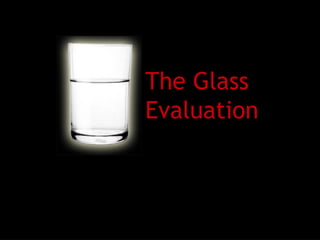
Glass Evaluation Perspectives 40/40
- 2. “ People look at a partially filled glass of water in one of five different ways.
- 3. Some look at the glass as being half full (the optimist) Some look at the glass as being half empty (the pessimist)
- 4. Some look at the glass and think “it doesn't matter , the water is going to evaporate anyway or someone will probably spill the water, etc.”
- 5. Some look at the glass and think “this is great, there are so many possibilities. We should form a committee, brainstorm and come up with some great ideas.”
- 6. Some look at the glass, and simply pick it up, fill it with water and say “this is done. What's next?”
- 7. While it might seem better to be an optimist than a pessimist, the reality is, if you simply look at the glass, it doesn't matter whether you are an optimist or pessimist, if you don't do anything, it doesn't really matter.
- 8. The person who takes the attitude that it doesn't matter because something negative will happen tends to be an energy drain on everyone around them and tries to hold others back The person who thinks “this is great, let's discuss” seems to be a very positive person but tends to tie things up for long periods of time in committees and discussions. The person who simply fills the rest of the glass and is ready to move on is very proactive.
- 9. When looking at these five categories, it seems easy to determine which is the most dangerous. It might seem the negative person from the third group would be the most dangerous but the reality is, while they are somewhat of an energy drain, they frequently get isolated and don't have too much of an impact.
- 10. The dangerous group are the ones who get excited about things and then tie them up in committees for long periods of time. They get people excited, and the expectations are great. Something will happen at the start, and the project will lose steam.
- 11. The proactive person from the fifth group is the one who gets the most done but it's important to have someone to temper their behavior. While they get a lot done, there are times they take the initiative before knowing all the facts.
- 12. Knowing which category people fall into will help you to know how to manage them better. Knowing which category you fall into can help you improve as a manager and as a person.
- 13. The challenge is being honest and objective in your analysis.
